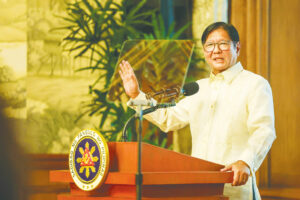By Kenneth Christiane L. Basilio, Reporter
PRESIDENT Ferdinand R. Marcos, Jr. and Vice-President Sara Duterte-Carpio’s trust ratings fell in September, according to a poll released late on Tuesday, amid a widening corruption scandal involving flood-control projects.
About 43% of Filipinos said they trusted Mr. Marcos, down from 48% in June, according to a statement from policy think tank Stratbase Institute, which commissioned the survey by the Social Weather Stations (SWS).
Ms. Duterte’s trust rating dropped by eight points to 53%, the steepest decline this year, according to the think tank.
“These results reflect a shifting public mood,” Stratbase Institute President Victor Andres C. Manhit said in a statement. “Filipinos are reassessing their confidence in the country’s top leaders.”
SWS interviewed 1,500 Filipinos from Sept. 24 to 30 for the poll, which had an error margin of ±3 points.
Mr. Marcos spotlighted a flood control scandal involving billions worth of pesos during his July state of the nation address, bringing the issue to the public that has sparked a political fallout for his administration.
The controversy gripped the flood-prone country, fueling street protests, exposing cracks within the political establishment and has dimmed economic outlook.
Authorities have since formed a fact-finding body to investigate anomalous flood control deals that has summoned key political figures including a former Speaker, senators, congressmen and the government’s Budget secretary.
But the Independent Commission for Infrastructure (ICI) has opted to hold its hearings behind closed doors, compared with earlier televised congressional inquiries that brought the issue into limelight.
“When people see decisive, transparent action on the issues affecting their daily lives, confidence follows,” Mr. Manhit said. “When they don’t, it erodes, no matter how popular the leader once was.”
Palace Press Officer Clarissa A. Castro said the President is unfazed by survey figures, citing his priority remains delivering public service.
Mr. Marcos’ trust ratings have fluctuated since February (43%), coinciding with Ms. Duterte’s impeachment. Support fell to its lowest so far this year in April (36%), when ex-President Rodrigo R. Duterte was flown to The Hague to face crimes against humanity charges before the International Criminal Court.
“President Marcos is clearly seen as someone who is genuinely working and fighting against corruption,” Ms. Castro told reporters in a Viber message in Filipino. “He remains relentless in his efforts to improve the lives of every Filipino, even amid the challenges brought by natural disasters.”
While the administration’s anti-corruption drive is commendable, “the public no longer rewards words, they demand results,” Ederson DT. Tapia, a political science professor at the University of Makati, said in a Facebook Messenger chat.
“Exposing wrongdoing is one thing; ensuring full accountability is another,” he said. “Unless investigations lead to actual prosecution and convictions, reforms and cleaner systems, the public will see this as political theater.”
“Right now, both the President and the Vice-President are losing the moral high ground… They want leaders who face scrutiny, not those who hide behind it,” he added.
In a separate poll, nine of 10 Filipinos think there is collusion among politicians, contractors and other officials to defraud infrastructure funds, though opinions remain split on whether the government could be trusted to resolve the issue.
About 56% of respondents said they were uncertain whether they could trust the ICI in solving the corruption scandal, according to a noncommissioned Pulse Asia Research, Inc. survey released on Wednesday.
“In governance, credibility is earned not by revelation but by resolution,” Mr. Tapia said.
Only two of 10 Filipinos said they trust the fact-finding body, while 21% expressed distrust, according to a poll of 1,200 respondents from Sept. 27-30, with an error margin of ±2.8 points.
About 45% of Filipinos said they do not trust Mr. Marcos to resolve the flood control scandal, while only 32% expressed trust and 23% remained undecided, showing widespread skepticism over the administration’s handling of the issue.
The poll showed that about seven of 10 Filipinos think government officials linked to the flood control projects will be held accountable. “[This is] an opinion shared by huge majorities across areas and classes,” Pulse Asia said.
